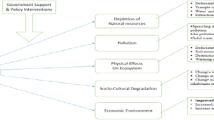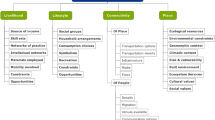Abstract
Place marketing of cities tends to be seen as a pragmatic, rather than a political, activity aimed at bringing prosperity to localities. It is argued here that the reverse is the case: place marketing is an essentially political activity that demonstrates different political, or more accurately, class settlements by its impact on cities. The political shift to neo-liberalism ended the post-war social democratic settlement and ushered in a new era for place marketing. Place marketing was an integral part of that settlement. It was particularly associated with gentrification that, it is argued, is a political strategy by which neo-liberalism takes control of the city. Place marketing, however, reached its limits by the end of the long boom in 2008. But now that crisis has discredited neo-liberalism, it is unlikely that the place marketing that characterized the past years will remain. If place marketing symbolises different political settlements, then the politics that emerges out of this crisis will generate another type of place marketing.
Similar content being viewed by others
References
Anholt, S. (2008) Place branding: Is it marketing, or isn’t it? Place Branding and Public Diplomacy 4: 1–6.
Boddy, M. and Parkinson, M. (eds.) (2004) City Matters: Competition, Cohesion and Urban Governance. Bristol, UK: Policy.
Booth, P. and Boyle, R. (1993) See Glasgow, see culture. In: F. Bianchini and M. Parkinson (eds.) Cultural Policy and Urban Regeneration. Manchester, UK: MUP.
Boyer, C. (1995) The great frame-up: Fantastic appearances in contemporary spatial politics. In: H. Liggett and D. Perry (eds.) Spatial Practices: Critical Explorations in Social/Spatial Practice. London: Sage, pp. 81–109.
Brandon, A. (2009) A sporting chance. Regeneration and Renewal 7, 12–13 December.
Cochrane, A. (1993) Whatever Happened to Local Government? Buckingham, UK: Open University Press.
COHRE. (2007) Fair Play for Housing Rights: Mega-Events, Olympic Games and Housing Rights. Geneva: Center on Housing Rights and Evictions.
Crouch, C. (2000) Coping with Post-Democracy. London: Fabian Society.
Davis, M. (1990) City of Quartz. London: Verso.
Dench, G., Gavron, K. and Young, M. (2006) The New East End: Kinship, Race and Conflict. London: Profile Books.
Donald, J. (1999) Imagining the Modern City. London: Athlone Press.
Eisenschitz, A. and Gough, J. (1993) The Politics of Local Economic Planning. London: Macmillan.
Euchner, C. (1999) Tourism and sports. In: D. Judd and S. Fainstein (eds.) The Tourist City. New Haven, CT: Yale University Press, pp. 215–232.
Fogelsong, R. (1999) Walt Disney world and Orlando: Deregulation as a strategy for tourism. In: D. Judd and S. Fainstein (eds.) The Tourist City. New Haven, CT: Yale University Press, pp. 89–106.
Frieden, B. and Sagalyn, B. (1990) Downtown Inc: How America Builds Cities. Cambridge, MA: MIT.
Gertner, D. (2007) Place banding: Dilemma or reconciliation between political ideology and economic pragmatism? Place Branding and Public Diplomacy 3: 3–7.
Gough, J., Eisenschitz, A., with and McCulloch, A. (2006) Spaces of Social Exclusion. London: Routledge.
Hanley, J. (2010) Is John Lewis the best company in Britain to work for? Guardian 16 (3).
Harvey, D. (1989) The Condition of Postmodernity. Oxford: Blackwell.
Henderson, S., Bowlby, S. and Raco, M. (2007) Refashioning local government and inner-city regeneration: The Salford experience. Urban Studies 44 (8): 1441–1463.
New Economic Foundation. (2004) Clone Town Britain. London: New Economic Foundation.
Ockman, J. (2004) New politics of the spectacle: ‘Bilbao’ and the global imagination. In: D. Lasansky and B. McLaren (eds.) Architecture and Tourism: Perception, Performance and Place. Oxford: Berg, pp. 227–239.
Parker, R. (1999) Las Vegas: Casino gambling and local culture. In: D. Judd and S. Fainstein (eds.) The Tourist City. New Haven, CT: Yale University Press, pp. 107–123.
Power, A., Ploger, J. and Winkler, A. (2008) Transforming Cities Across Europe; An Interim Report on Problems and Progress. London: LSE/CASE.
Ramonet, I. (2002) The social wars, http://archives.econ.utah.edu/archives/marxism/2002w46/msg00168.htm, accessed 12 December 2008.
Rein, I. and Shields, B. (2007) Place branding sports: Strategies for differentiating emerging, transitional negatively viewed and newly industrialised nations. Place Branding and Public Diplomacy 3: 73–85.
Roche, M. (2000) Mega-Events: Olympics and Expos in the Growth of Global Culture. London: Routledge.
Scott, A. (2006) Creative cities: Conceptual issues and policy questions. Journal of Urban Affairs 28 (1): 1–17.
Smith, D. (1989) North and South: Britain's Economic, Social and Political Divide. London: Penguin.
Smith, N. (2002) New globalism, new urbanism: Gentrification as global urban strategy. Antipode 34 (3): 427–450.
Turkie, J.-J. (1991) An examination into the role of the state in the development of Canary Wharf. MA thesis, Middlesex University, London.
Vogelsong, R. (1999) Walt Disney World and Orlando deregulation as a strategy for tourism. In: D Judd and S. Fainstein (eds.) The Tourist City. New Haven, CT: Yale University Press, pp. 89–106.
Ward, S. (1998) Selling Places: The Marketing and Promotion of Towns and Cities 1850–2000. London: Spon.
Widgery, D. (1991) Some Lives: A GP's East End. London: Sinclair-Stephenson.
Wilkinson, R. and Pickett, K. (2009) The Spirit Level: Why More Equal Societies Almost Always Do Better. London: Allen Lane.
Williamson, T., Imbroscio, D. and Alperovitz, G. (2002) Making a Place for Community: Local Democracy in a Global Era. New York: Macmillan.
Author information
Authors and Affiliations
Corresponding author
Rights and permissions
About this article
Cite this article
Eisenschitz, A. Neo-liberalism and the future of place marketing. Place Brand Public Dipl 6, 79–86 (2010). https://doi.org/10.1057/pb.2010.12
Received:
Revised:
Published:
Issue Date:
DOI: https://doi.org/10.1057/pb.2010.12




